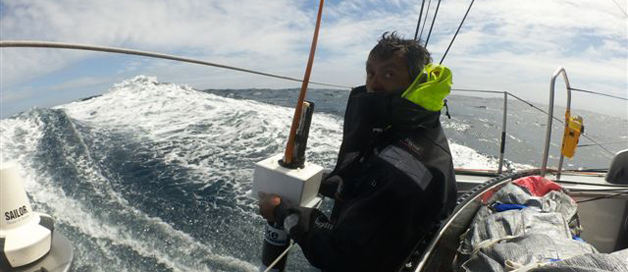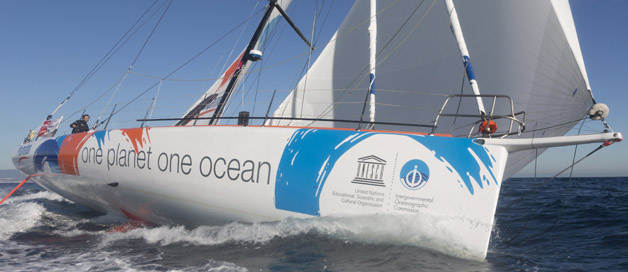Around the world in 98 days
Aleix Gelabert and Dídac Costa arrived in Barcelona this evening aboard One Planet One Ocean & Pharmaton, proudly displaying the logo of the Intergovernmental Oceanographic Commission of UNESCO on its bow, completing a lap of the globe that kicked off on 31 December 2014. They were sailing with a purpose, as the Barcelona World Race made a pioneering commitment to ocean research: for the first time, every vessel competing in an ocean race was given a scientific mandate. Each crew deployed an Argo float in an optimal position and collected data in remote and seldom traveled areas along their route to contribute to scientific projects and a better understanding of our climate. One Planet One Ocean & Pharmaton also collected samples of microplastics to gain insights on the impacts of man-made pollution.
Over the past week, One Planet One Ocean & Pharmaton had been engaged in a harrowing duel for 4th place with We Are Water, which is still close behind and should arrive in Barcelona in the morning. The winners, Bernard Stamm and Jean Le Cam, raced to victory in just over 84 days. “We are very happy to have arrived, satisfied at having achieved it" said Aleix Gelabert. This was their first round the world challenge. Didac Costa added "besides, we did it quite fast so we are very satisfied. It's been fantastic.”
One Planet, One Ocean is the motto of the Intergovernmental Oceanographic Commission (IOC-UNESCO), and highlights the close collaboration with the Fundació Navegació Oceànica Barcelona (FNOB), which created the Barcelona World Race. Working together with other scientific institutions, IOC-UNESCO and FNOB have built an unprecedented alliance between the sailing and scientific communities to contribute to ocean observation and research.
FNOB and the Barcelona World Race’s pioneering commitment has already opened the way for further collaboration between sport and science to gather vital ocean knowledge. On 23 March 2015, all six of the Volvo Ocean Race teams each deployed a drifter in the Southern Ocean – a region oceanographers don't get to visit regularly, but one that is critically important to observe. The deployments were organized in partnership with the National Oceanic and Atmospheric Administration (NOAA) and in coordination with the Joint WMO-IOC Technical Commission for Oceanography and Marine Meteorology, which facilitates the optimization of ocean observation networks.

The Neutrogena crew were the first to deploy their Argo float during the Race. © Guillermo Altadill & José Muñoz/ Barcelona World Race
During the Barcelona World Race, each crew participated in two projects:
- The Argo project , by deploying an Argo float in an optimal location along the route. These floats collect highly accurate temperature and salinity data from depths of 2,000 m up to the sea's surface. This data is crucial for oceanographers studying the behaviour of vast areas of seawater, which is key in the bid to understand the evolution of the planet's climate.
- The Citclops project, which was set up to retrieve and use data on seawater colour, transparency and fluorescence to determine its quality and above all the effect on plankton.
One Planet, One Ocean carried additional equipment to participate in two additional projects:
- New equipment to track surface temperature and salinity levels. These are two simple variables, yet extremely valuable to science. Through them, oceanographers can learn a great deal about the dynamics of the ocean and how it relates to climate changes.
- A system to collect geolocalized, marine water surface samples, using a system of microfilters, to measure the presence of microscopic plastic particles. These harmful particles affect the biological cycles of many species that ingest them, and their presence in the ocean is increasing.
It is a unique and innovative project in that it will allow the collection of relevant data along the race course, especially in the various zones of the route where little to no information has yet been compiled, while raising awareness of our impact on the environment. Following this very special boat as it sailed the IOC-UNESCO logo and motto around the world has been fascinating – and quite an honour. Welcome home.
Related links:
- Barcelona World Race contribution to science
- Intergovernmental Oceanographic Commission of UNESCO (IOC-UNESCO)
- More information on the Argo project (pdf)
- Home at last: One Planet, One Ocean & Pharmaton take fourth
- NOAA Press release: Round-the-world sailors help NOAA gather data in Southern Ocean to improve forecasts
- The race is not over! Follow the Barcelona World Race
Follow One Planet, One Ocean and Pharmaton:
- On Facebook
- On Twitter: @aleix_didac , #oneplanetoneocean

One Planet, One Ocean & Pharmaton, competing in the Barcelona World Race. Photo Gilles Martin-Raget / Barcelona World Race.
<- Back to: All news


